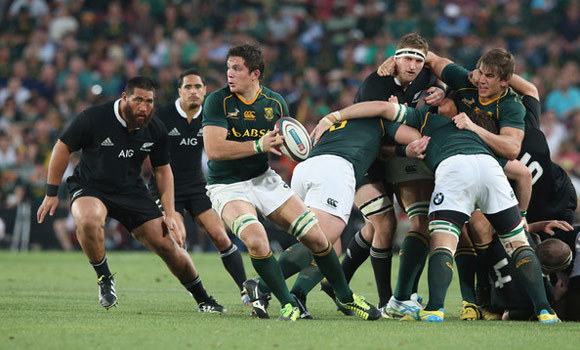Separating larks from owls can help Boks
13 November 2014 | Story by Newsroom
Scientists from the University of Cape Town (UCT) are trying to devise a jet-lag strategy for the Springboks, tailor-made for the larks and the owls on the team.
An effective jet-lag treatment that differentiates between early and late risers could prove useful beyond the rugby field '“ business travellers and tourists could also benefit, according to Lovemore Kunorozva, a PhD student in the Department of Molecular and Cell Biology.
Jet lag happens when a person's body clock is out of kilter with the time zone to which he or she has travelled. It generally gets worse with age, and it typically takes a person a day per time zone to adapt.
Scientists already know that a person's genetic make-up influences whether they are early or late risers, and that early risers generally adapt better to eastward travel than late risers. Now Kunorozva is part of a team that is trying to figure out whether it is possible to create a jet-lag mitigation programme tailor-made for the two distinct genetic profiles.
New techniques to counter the effects of jet lag are likely to be of interest to the Springboks, as a slip in concentration can make the difference between a try and no score, or an injury and a narrow escape.
"Jet lag affects each team member differently. Some adapt well, others more slowly. But there's no doubt it is harder to adapt going east to Australia or New Zealand than going west to Argentina," said team doctor Craig Roberts. "We already have certain tricks for managing it, such as manipulating meal times and using melatonin. We are also using glasses near bed time that cut out blue light, and others with blue lights attached to them that the players wear in the morning."
Kunorozva is planning to test the Springboks, to identify the larks and the owls. He expects to find a higher proportion of owls, as most rugby games are played in the afternoon or evening, he said. His previous research has found that athletes such as runners and cyclists tend to be larks, as their competitive events are generally in the morning.
Volunteers are being recruited to spend time in a jet-lag simulation laboratory, where Kunorozva will gauge how their genetic variation influences their response to strategies for recalibrating their body clocks.
Tests for variations in the PERIOD3 or '˜clock' gene, which influences whether a person is a lark or an owl, are not commercially available in SA, he said.
Lovemore Kunorozva is a PhD student in the Department of Molecular and Cell Biology. The principal investigators of the Chronobiology and Sports Performance projects are Dr Laura Roden, senior lecturer in the Department of Molecular and Cell Biology, and Dr Dale Rae, senior research officer at the Medical Research Council/University of Cape Town Research Unit for Exercise Science and Sport Medicine.
Story by Tamar Kahn. First published on Business Day Live. Image: zimbio.com.
 This work is licensed under a Creative Commons Attribution-NoDerivatives 4.0 International License.
This work is licensed under a Creative Commons Attribution-NoDerivatives 4.0 International License.
Please view the republishing articles page for more information.










